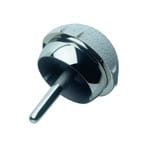Hip Resurfacing Has Unacceptably High Rate of Failure for Women
A follow-up of patients who received hip replacement surgery by the National Joint Registry of England and Wales has researchers issuing an ominous warning – women are strongly urged to avoid the hip replacement procedure known as “resurfacing,” according to a published report in the British medical journal, The Lancet.
The resurfacing procedure is often used on younger patients because it preserves more of the thigh bone than a total hip replacement (THR). Resurfacing allows various sizes of a cobalt-chromium metal cap to fit over the femoral head. The cap and is attached to the acetabulum or pelvic socket. In hip resurfacing, both surfaces are articulating metal-on-metal (MoM) surfaces.
The lead researcher from the University of Bristol reports that resurfacing failure rate in women and smaller men was “unacceptably high,” reports the New York Times. While a THR is designed to last at least 10 years, the resurfacing success was only seen in larger middle-aged men, according to the study.
In women, the revision rate in 55-year-old women was 8.3 percent with a 42 mm resurfacing head.
This is not new. Studies have shown for years that women were experiencing a higher failure rate from a MoM hip implant than men. That may be due to an implant needing to anchor into a strong bone, something not always found in post menopausal women.
These findings also echo those published last spring in The Lancet. Studying data from the National Joint Registry of England and Wales, metal-on-metal hip replacements failed at an unacceptably high rate – 6.2 percent within five years. Metal-on-plastic hip implants fared better at 1.7 percent failure rate, and ceramic-on-ceramic had a 2.3 percent early failure rate.
The metal-on-metal technology, whether resurfacing or THR, has increasingly come under scrutiny as patients have found (MoM) implants can shed metal debris such as cobalt and chromium ions into the bloodstream that can lead to metal toxicity and contribute to an early revision rate.
In most cases, MoM hips do not have to provide assurances for safety and efficacy, they only have to be the “substantial equivalent” of another device already being sold. This is the safety lapse within the FDA known as the 510(k) process that opens the door to unchecked devices.
Most Americans are unaware that anywhere from 75 to 90 percent of medical devices pass through the 510(k) gate to approval in the U.S. and these are the same devices that are failing in England, Australia and worldwide, as those countries often follow the U.S. lead to approval.
Just three metal-on-metal resurfacing hip implants went through the FDA’s premarket approval (PMA) process and were required to provide clinical data to prove safety before they were approved in the U.S. The Birmingham Hip Resurfacing was finally approved in the U.S. in 2006 after initially being denied. It joins the Conserve Plus by Wright Medical, approved by the FDA after a PMA in 2009, and the Cormet by Corin in 2007 – all resurfacing devices.
Unfortunately for the patients who discover after the fact that they are experiencing complications with these PMA devices, they cannot hold the manufacturer accountable due to a U.S. Supreme Court Decision, Riegel v. Medtronics, which gave medical device manufacturers immunity in court if their product received FDA approval.
However, the hip implants approved through a 510(k) that are defective are the subject of thousands of product liability lawsuits.
By the end of 2010, the FDA had cleared 175 hip implants or components for market through the less vigorous safety loophole known as the 510(k) process.
Share This



